- Key Points: Dharamshala, Niyund River, Nioli Village, Reoti Village.
- State: Himachal Pradesh, India.
- Duration: 4 Nights 5 Days.
- Altitude: 4,299 m (14,107 feet).
- Trek Distance: Approximately 07kms from the Kareri Lake.
- Summer temperature: (10°C to 20°C)
- Winter temperature: (-7°C to -1°C)
- Best Time To Visit: From April to June and September to October.
- Trek Level: Difficult.
- How to Reach: Take a bus from New Delhi/Chandigarh to Dharamshala, then take a local bus/taxi from Dharamshala to Ghera/Nioli Village, then start your trek from Nioli village.
- Budget: Under ₹9000-10,000 per person.
- Weather: In winter, Snow covers the peaks and in the summers you can experience a cool breeze.
Introduction to the Minkiani Pass
Have you ever dreamt of embarking on a breathtaking adventure through scenic landscapes, immersing yourself in the tranquility of nature while pushing your physical and mental limits? If so, then Minkiani Pass is the perfect destination for you. Nestled in the majestic Himalayas, Minkiani Pass offers an exhilarating trekking experience that showcases nature’s finest creations. In this article, we will delve into the enchanting world of Minkiani Pass, exploring its stunning beauty, challenging terrain, and the unforgettable memories awaiting those who dare to conquer this trekker’s paradise.
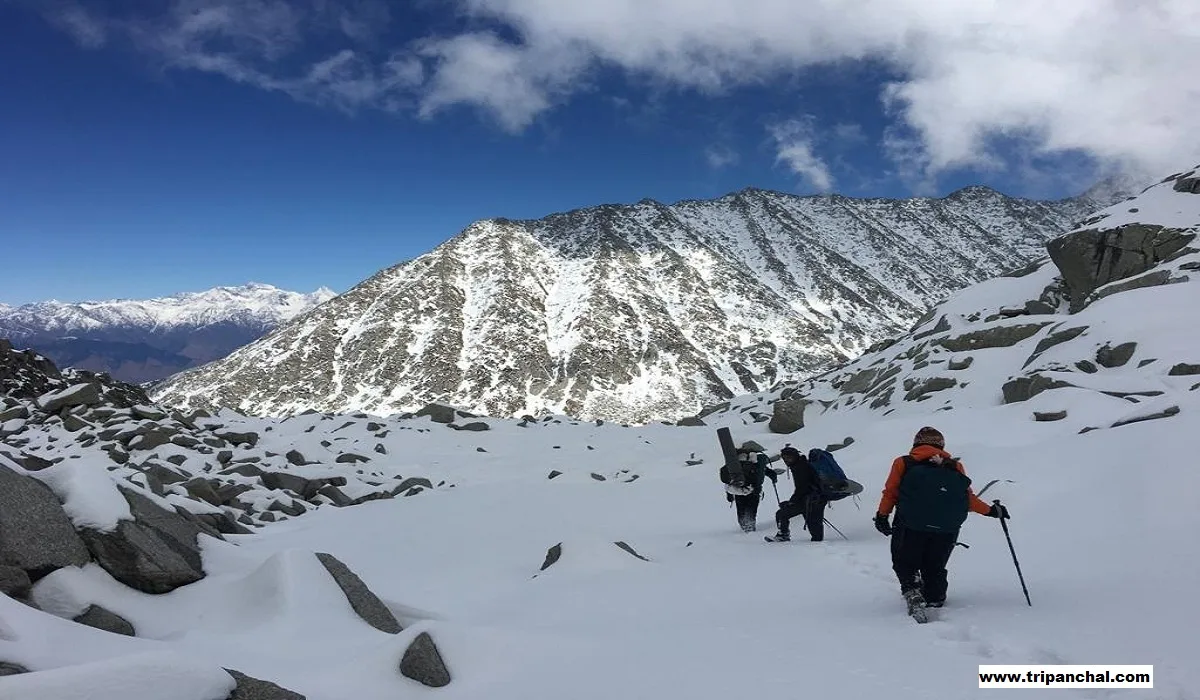
Table of Contents
- Overview of Minkiani Pass
- Preparing for the Trek
- Gathering Essential Gear
- Physical Fitness and Training
- The Trekking Experience
- Day 1: Nioli village to Reoti Village
- Day 2: Reoti Village to Kareri lake Base Camp
- Day 3: Kareri lake Base Camp to Minkiani Base Camp
- Day 4: Minkiani Base Camp to Kareri lake Base Camp
- Day 5: Kareri lake Base Camp to Nioli village
- Flora and Fauna of Minkiani Pass
- Diverse Vegetation
- Rare and Endangered Wildlife
- Captivating Landscapes and Natural Wonders
- Majestic Snow-Capped Peaks
- Crystal Clear Glacial Lakes
- Serene Waterfalls
- The Cultural Heritage of the Region
- Indigenous Communities and Their Traditions
- Local Cuisine and Delicacies
- Challenges and Safety Measures
- Weather Conditions and Seasonal Considerations
- Altitude Sickness and Acclimatization
- Navigation and Trekking Etiquette
1. Overview of Minkiani Pass
Minkiani Pass is a breathtaking mountain pass located in the heart of the Himalayas, connecting two picturesque valleys. Situated at an altitude of 14,107 feet, this pass offers a challenging yet rewarding trekking experience for adventure enthusiasts. Renowned for its stunning vistas, rugged terrains, and cultural significance, Minkiani Pass has become a magnet for trekkers seeking an unforgettable journey amidst nature’s grandeur.
2. Preparing for the Trek
2.1 Gathering Essential Gear
Before embarking on the Minkiani Pass trek, having the right gear to ensure a safe and comfortable journey is crucial. Some essential items include sturdy hiking boots, waterproof clothing, a reliable backpack, a sleeping bag, trekking poles, and a first aid kit. It is advisable to consult experienced trekkers or local guides to create a comprehensive gear checklist.
2.2 Physical Fitness and Training
This trek demands a good level of physical fitness due to its challenging terrain and high altitude. Engaging in regular cardio exercises, strength training, and endurance-building activities like hiking or jogging can significantly improve your fitness level. Additionally, practicing yoga and meditation helps in enhancing mental resilience and concentration.
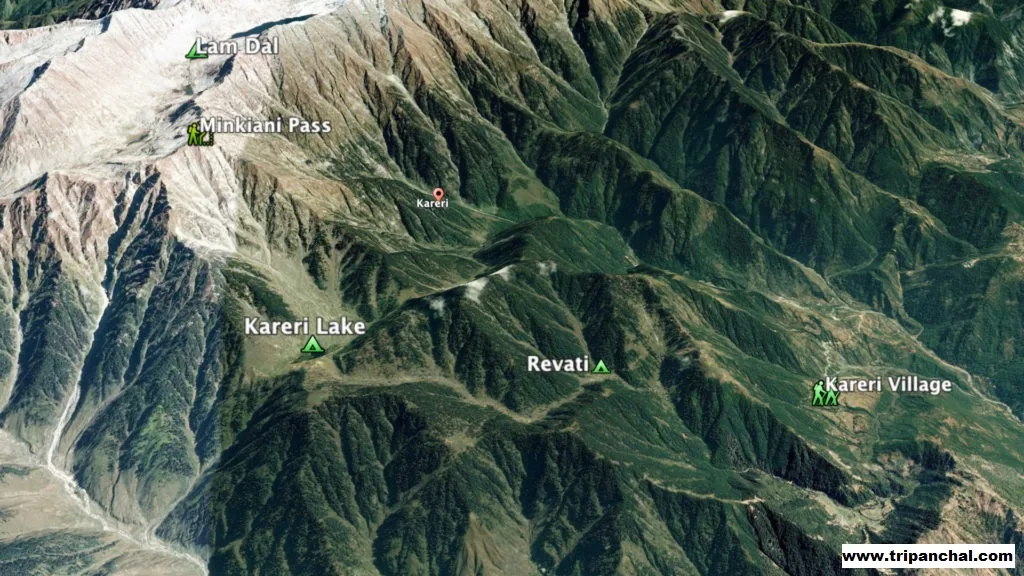
3. The Trekking Experience
3.1 Day 1: Nioli village to Reoti Village
The adventure begins with a trek from the Nioli Village towards the first campsite. As you traverse through dense forests, be prepared to witness nature’s wonders in the form of flora, gurgling streams, and melodious bird calls. The first campsite provides a perfect setting for trekkers to rest and soak in the serenity of the surroundings.
3.2 Day 2: Reoti Village to Kareri lake Base Camp
Continuing the journey, day two takes you deeper into the wilderness. Trekking alongside pristine rivers and ascending gentle slopes, the second campsite awaits you with its breathtaking views of snow-capped peaks. The mesmerizing beauty of the landscape will leave you spellbound.
3.3 Day 3: Kareri lake Base Camp to Minkiani Base Camp
On day three, the trek becomes more challenging as you ascend higher altitudes. Crossing steep ridges and navigating rocky trails, trekkers experience a true test of endurance. However, the awe-inspiring panoramas and the sense of achievement propel you forward.
3.4 Day 4: Minkiani Base Camp to Kareri lake Base Camp
The most exhilarating part of the trek arrives as you approach the summit of Minkiani Pass. Scaling steep slopes and traversing glaciers, you are rewarded with breathtaking 360-degree views of the surrounding peaks. The feeling of standing atop the pass, with the wind brushing against your face, is nothing short of euphoric.
3.5 Day 5: Kareri lake Base Camp to Nioli village
The final leg of the trek takes you back to the Nioli Village, retracing your steps through the mesmerizing landscapes. As you bid farewell to Minkiani Pass, a profound sense of accomplishment and a treasure trove of memories accompany you on the descent.
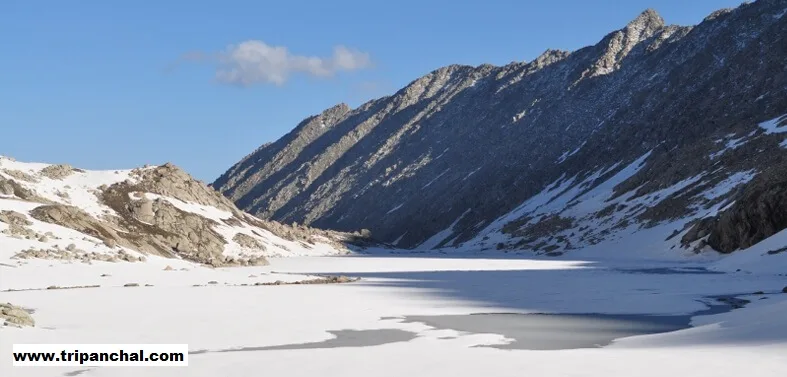
4. Flora and Fauna of Minkiani Pass
4.1 Diverse Vegetation
Minkiani Pass is blessed with a rich variety of vegetation, ranging from alpine forests to vibrant meadows adorned with wildflowers. Rhododendrons, junipers, and birch trees add splashes of color to the landscape, creating a picturesque setting for trekkers to immerse themselves in nature’s palette.
4.2 Rare and Endangered Wildlife
The region surrounding Minkiani Pass is home to a diverse array of wildlife. Trekkers may spot elusive Himalayan monals, ibex, snow leopards, and even the mighty Himalayan brown bear if fortunate. Witnessing these magnificent creatures in their natural habitat is an experience that leaves an indelible mark on any trekker’s heart.
5. Captivating Landscapes and Natural Wonders
5.1 Majestic Snow-Capped Peaks
One of the highlights of the Minkiani Pass trek is the breathtaking view of snow-capped peaks. Gazing at towering giants like Sickle moon peak, you are reminded of the grandeur and raw power of nature.
5.2 Crystal Clear Glacial Lakes
Enroute to Minkiani Pass, trekkers are blessed with the sight of crystal-clear glacial lakes reflecting the azure sky. These serene bodies of water, such as Lam dam lake, offer a tranquil spot to rest and rejuvenate amidst the surreal surroundings.
5.3 Serene Waterfalls
As you journey through Minkiani Pass, you’ll encounter enchanting waterfalls cascading down the mountainsides. The sound of rushing water and the misty spray create a refreshing atmosphere, providing a welcome respite from the challenging trek. Take a moment to bask in the beauty and serenity of these natural wonders.
6. The Cultural Heritage of the Region
6.1 Indigenous Communities and Their Traditions
Minkiani Pass not only boasts breathtaking landscapes but is also home to indigenous communities with rich cultural traditions. Interacting with the locals, you’ll get a glimpse into their way of life, customs, and traditions. Their warm hospitality and stories of survival in this harsh yet beautiful environment will leave a lasting impression on your trekking adventure.
6.2 Local Cuisine and Delicacies
No trekking experience is complete without savoring the local cuisine. Along the Minkiani Pass trek, you’ll have the opportunity to indulge in delicious regional delicacies. From hearty dal and rice to mouthwatering momos, the flavors of the Himalayas will tantalize your taste buds and fuel your journey.
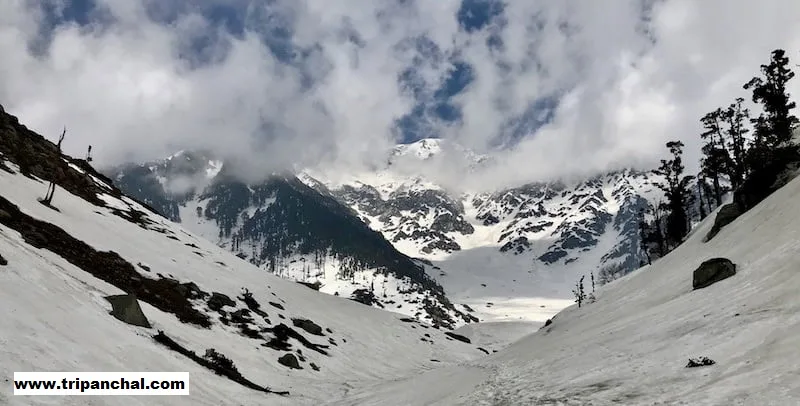
7. Challenges and Safety Measures
7.1 Weather Conditions and Seasonal Considerations
Minkiani Pass is subject to unpredictable weather conditions, making it essential to plan your trek carefully. The best time to undertake the trek is during the summer months when the weather is relatively stable. However, even during the favorable season, be prepared for sudden changes and pack appropriate clothing and gear to tackle rain, wind, and lower temperatures.
7.2 Altitude Sickness and Acclimatization
Due to the high altitude of Minkiani Pass, trekkers may experience symptoms of altitude sickness. It is crucial to allow your body time to acclimatize to the thin air and take necessary precautions. Stay hydrated, ascend gradually, and listen to your body’s signals. If symptoms worsen, descend to lower altitudes immediately and seek medical assistance if necessary.
7.3 Navigation and Trekking Etiquette
Navigating the Minkiani Pass trek requires a basic understanding of map reading and compass skills. Ensure you have a detailed map and familiarize yourself with the route before embarking on the journey. Additionally, practicing proper trekking etiquette, such as respecting the environment, minimizing waste, and staying on designated trails.
FAQs
Q1: Is prior trekking experience necessary to undertake the Minkiani Pass trek?
While prior trekking experience is beneficial, it is not mandatory. However, a good level of physical fitness and mental preparation is essential to tackle challenging terrain and high altitudes.
Q2: Are permits required to trek in Minkiani Pass?
No, trekkers no need to obtain the necessary permits but we suggested to take a local guide. He will safely guides you about the trekking route.
Q3: What is the best time to undertake the Minkiani Pass trek?
The ideal time to trek Minkiani Pass is during the summer months, from May to September when the weather is relatively stable. However, it is advisable to check the current weather conditions and plan accordingly.
Q4: How long does the Minkiani Pass trek typically take to complete?
The trek usually takes around 5 days to complete, including acclimatization days and rest stops at various campsites.
Q5: Are there any accommodation options available during the trek?
Accommodation during the trek primarily consists of camping in tents. Trekkers need to carry their camping equipment or hire them from trekking agencies.
Q6: Kareri lake to Minkiani Pass distance?
Approximately 07 kms from the Kareri Lake.
Q7: How to reach Minkiani Pass?
Take a bus from New Delhi/Chandigarh to Dharamshala, then take a local bus/taxi from Dharamshala to Ghera/Nioli Village, then start your trek from Nioli village.
Q7: How to reach Minkiani Pass from Mcleodganj?
Take a local bus/Auto/Taxi from Mcleodganj to Dharamshala bus stand, then take a HRTC bus/taxi from Dharamshala bus stand to Ghera/Nioli Village, then start your trek from Nioli village.
Things to keep in mind while traveling:
- Do not roam alone at night. It’s not safe.
- Respect Pahari culture and don’t argue/fight with people around you.
- Do not litter in the mountains.
- Save mountains, Save Nature.
- Don’t do trekking with drugs.
- Always carry a medical box, torchlight, trekking stick, trekking shoes, warm clothes, a raincoat, and a water bottle with you.
- Always walk carefully and Do not trek in bad weather.
By clicking on the below link, you can book a room in the hostel/Camping according to your choice
The hosteller- Mall Road, Mcleod Ganj
Cafe’s Nearby Mcleod Ganj
Also Read: How to reach Kareri lake trek from Delhi
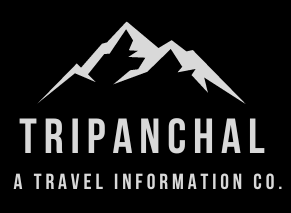
I am sure this post has touched all the internet users, its really really good piece of writing on building
up new web site.